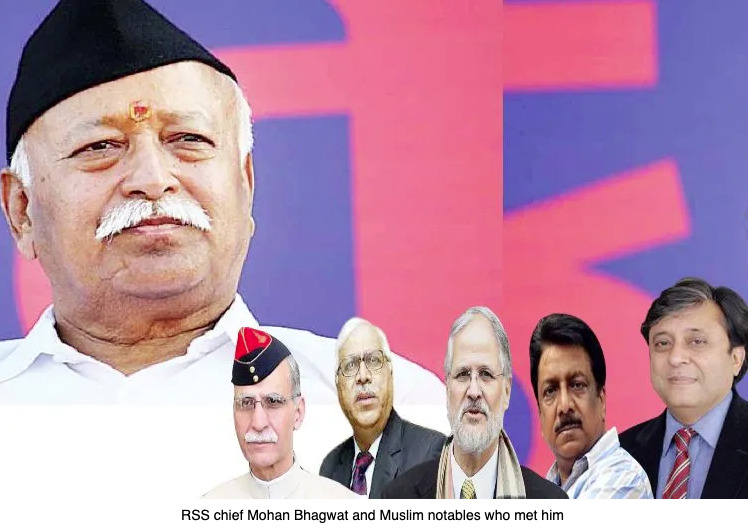“Will you walk into my parlour?” said the spider to the fly,
” Tis the prettiest little parlour that ever you did spy.”
[ Mary Hewitt. 1829]
The road to the Hindu Rashtra, along with that other place most of us are headed for, is paved with good intentions. I refer, of course, to the August meeting which five noted Muslim members of civil society had held with Mr. Bhagwat, the RSS Sarsanghchalak. I have no doubt at all that Mr. Quraishi, Najib Jang et al had no ulterior motive, that their intentions were honest and that they sincerely wished to act as bridge between the minorities and the Hindutva forces. But it was a horrendous error of judgment nonetheless, both strategically and tactically.
As a strategy it was short-sighted and surprisingly naive, given that these gentlemen are experienced in public life and have risen to the top of their professions: they should have known better. Firstly, why talk to the RSS at all ? It has no official standing, functions as an extra-constitutional force, and has no formal role in our governmental structure. When this question was put to Mr. Quraishi by Karan Thapar he replied that the RSS was already a legitimate force and that therefore there was nothing wrong in talking to it. I would beg to differ with my senior colleague: the RSS may be a legal organisation, it may be the power behind the throne, but its larger legitimacy is in doubt, and has always been. It has been repeatedly banned, is suspected to specialise in stirring the communal pot, is behind many of the excesses of the present regime, is distrusted by the minorities. There is a difference between legality and legitimacy- the former is a function of law, the latter of social acceptability across the board and not by just one community.
The second strategic mistake was to talk with an organisation primarily responsible for the ongoing subjugation of the community to which these five gentlemen belong, beginning with the movement against the Babri Masjid. How could they have trusted the Sarsanghchalak, given his record of double speak? He had said, after the SC judgment on Babri Masjid, that the RSS would not campaign for “restoration” of any other temples- but has launched a movement against the mosques at Kashi, Mathura and God knows where else. He talks of a common Indian DNA but insists that Muslims in India should be known as Hindu Muslims. He talks of treating Muslims as bona fide citizens of India, but does nothing to stop his own govt. from practically disenfranchising them at every turn. Going to talk to such a person with his stated position, at HIS behest and in HIS office, amounts to abject surrender (not “appeasement” as another commentator has termed it, in my view). And those who surrender, or are seen to be supplicants, cannot set the terms of any treaty or agreement.
Tactically too, it is apparent that our five friends have had the tables turned on them: it appears that there was no agreed upon agenda for the meeting. Consequently Mr. Bhagwat got the two assurances/ clarifications he wanted (for whatever they are worth) on “kaffirs” and beef consumption, whereas our five interlocutors got nothing in return. The RSS Supremo had cleverly prepared his exit suit in advance: according to Quraishi/Jung, he expressed his helplessness by stating that he lacks support, that he has his limitations, that his word is not law, that he is subjected to criticism. Why then talk to him at all? A question asked by Karan Thapar, without any satisfactory reply.
The discussion seems to have been at a dialectical, almost philosophical, level and therefore doomed to failure. No attempt was made to take up the real life issues that matter to Muslims today, their serial persecution: CAA, NRC, hijab bans, Dharam Sansads, bulldozers, hate speech, demolition of madrasas. On none of these has Mr. Bhagwat uttered a word in the past. Surely, any meaningful discussion should have posed these subjects to him, if only to know where he stands on them. Sadly, the opportunity to do so went abegging- why?
I am loathe to say so, but after watching the interview with Karan Thapar, it seemed to me that, in order to justify their meeting, Quraishi-Jung sounded like apologists and interpreters for Mr. Bhagwat. They excuse him for his non-committal stance, they would “like to believe” him even though they “can’t read his mind”, they find his body language reassuring (!). The fact that he listened to them with “rapt attention” and without any interruption, we are told, shows his sincerity. They even admire his sense of humour ( though I don’t in the least find that reassuring). The duo are constantly interpreting what the Sarsanghchalak said- or, more important, did not say- in order to extract from the ore a nugget of hope which is just not there.
It is important to note that, (as far as I am aware), Mr. Bhagwat has not said a word about the meeting in public, or confirmed any of the conclusions/ interpretations of it that Quraish-Jung have revealed in their interview with Karan Thapar. He does not have to, he has got what he wanted. As far as he is concerned the meeting has served its purpose as a PR exercise. Our five friends have burnished his fading international image and given him a fresh lease of life as an ideologue sensitive to the concerns of the minorities, willing to engage with them, and willing to revisit his beliefs. None of that has been proven or even demonstrated. Which is why this meeting, a masterpiece of double speak on the part of Mr. Bhagwat, should never have taken place. A fly should think twice before venturing into the spider’s parlour.
| The author retired from the IAS in December 2010. A keen environmentalist and trekker he has published a book on high altitude trekking in the Himachal Himalayas: THE TRAILS LESS TRAVELLED.
His second book- SPECTRE OF CHOOR DHAR is a collection of short stories based in Himachal and was published in July 2019. His third book was released in August 2020: POLYTICKS, DEMOCKRAZY AND MUMBO JUMBO is a compilation of satirical and humorous articles on the state of our nation. His fourth book was published on 6th July 2021. Titled INDIA: THE WASTED YEARS , the book is a chronicle of missed opportunities in the last nine years. Shukla’s fifth book – THE DEPUTY COMMISSIONER’S DOG AND OTHER COLLEAGUES- was released on 12th September 2023. It portrays the lighter side of life in the IAS and in Himachal. He writes for various publications and websites on the environment, governance and social issues. He divides his time between Delhi and his cottage in a small village above Shimla. He blogs at http://avayshukla.blogspot.in/ |



